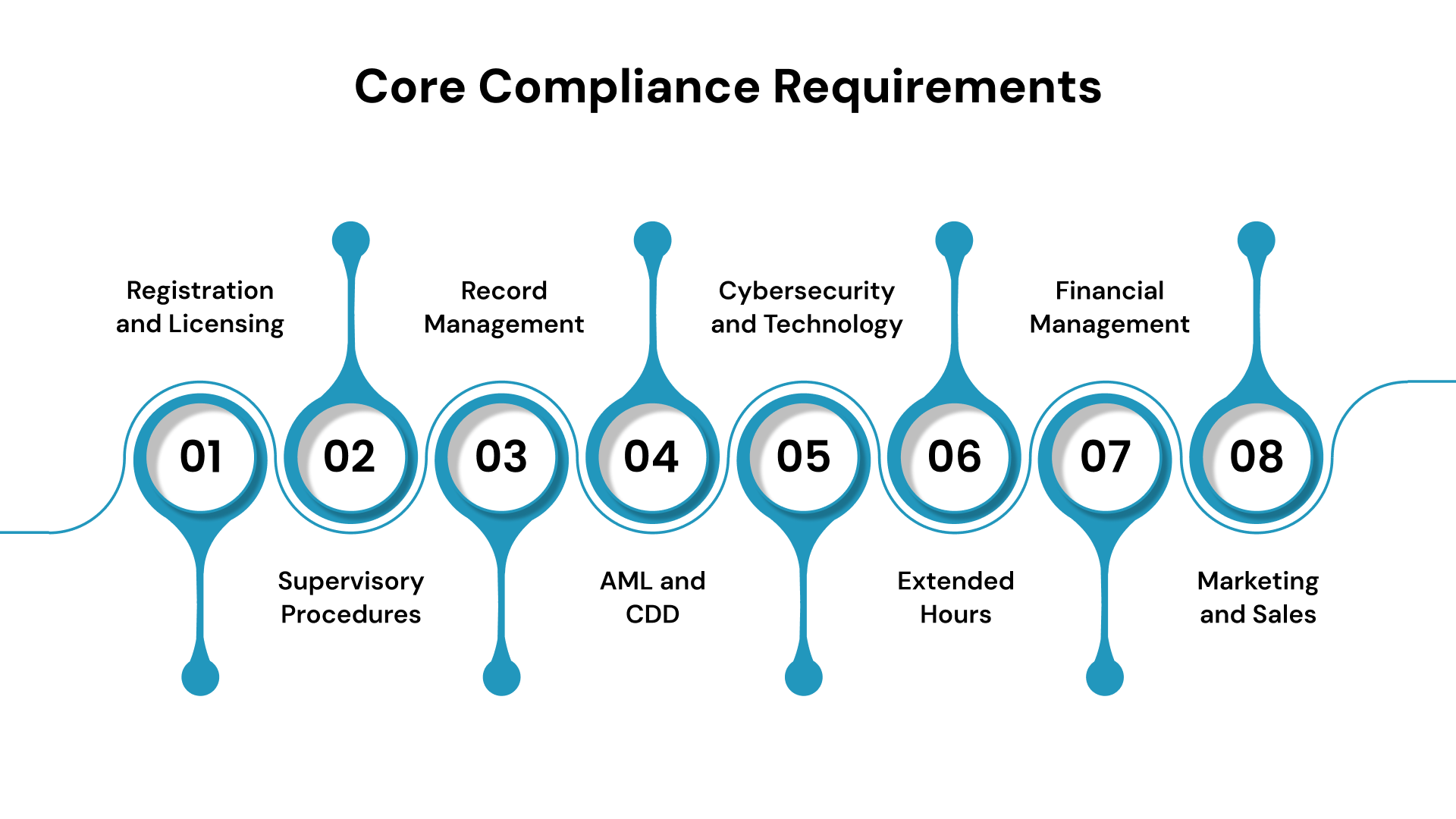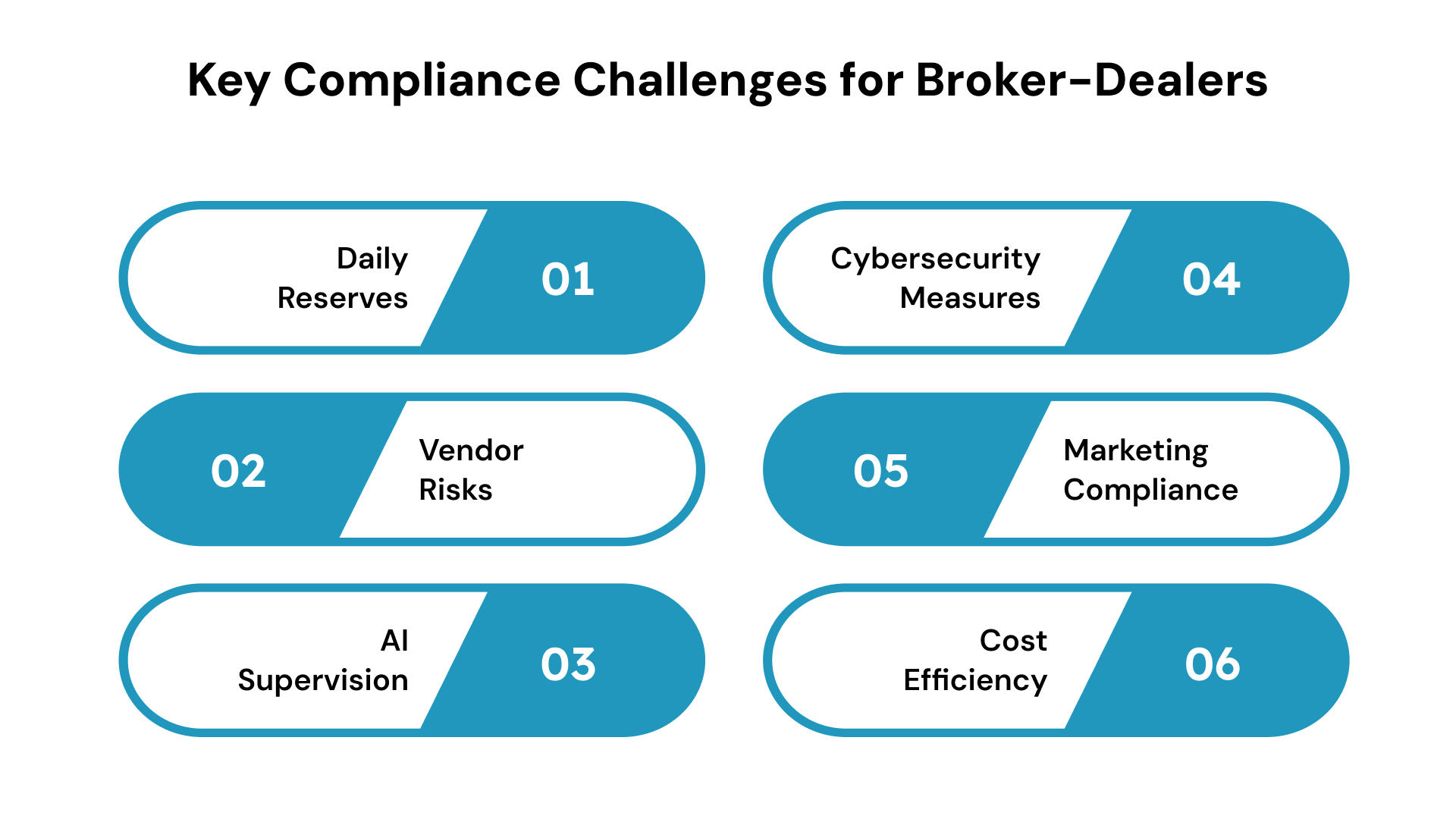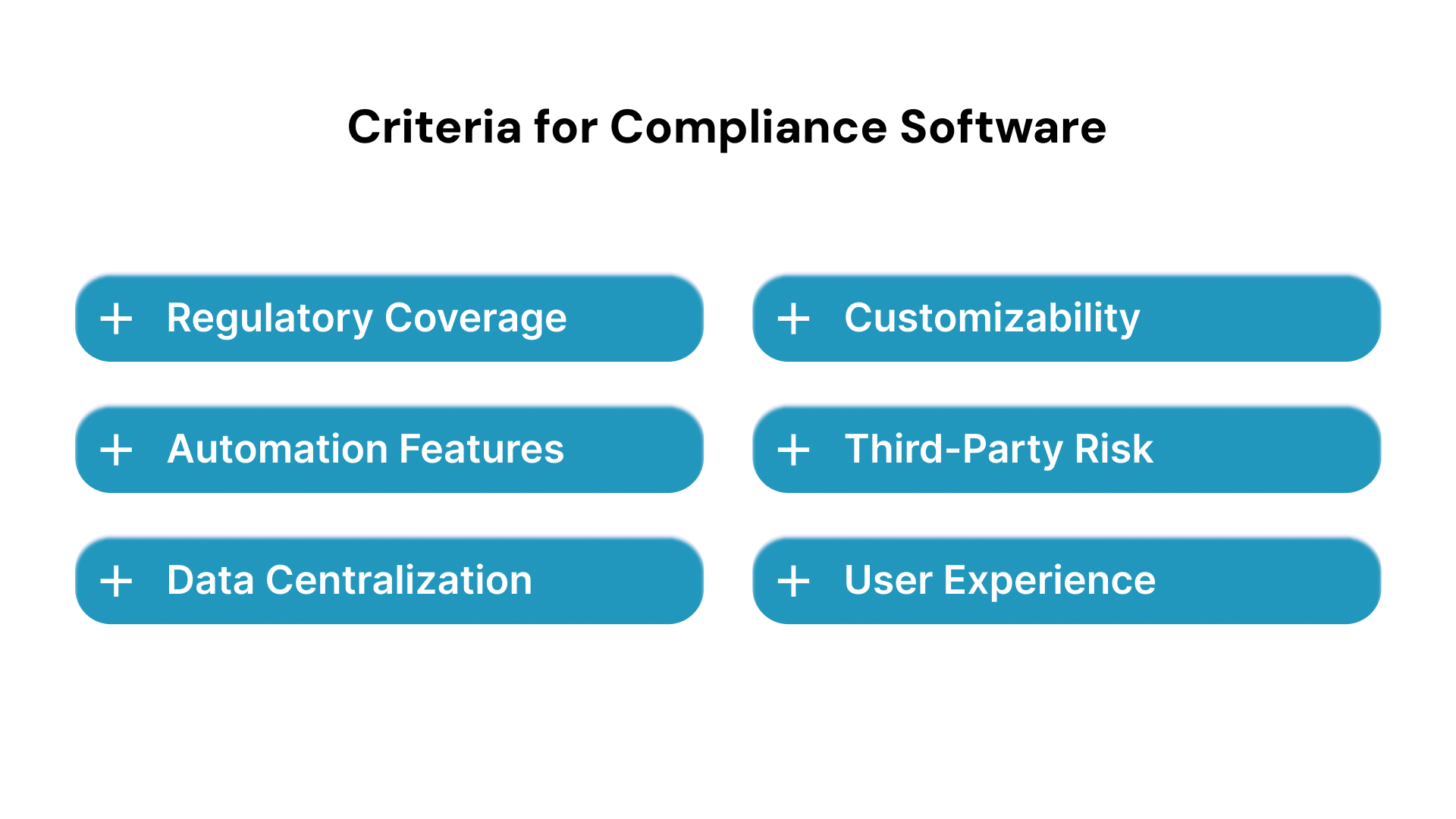Broker Dealers’ Compliance Requirements in 2025: Essential Updates and Software Guidance
Compliance for broker-dealers involves adhering to rules set by regulatory bodies like the SEC and FINRA, which ensure fairness, transparency, and investor protection in the securities industry. The SEC focuses on protecting investors and maintaining market integrity, while FINRA supervises the daily operations of broker-dealers. These regulations are designed to make sure broker-dealers act fairly, keep accurate records, protect their customers, and stay within the law. Let’s take a closer look at the key compliance requirements broker-dealers need to meet in 2025.

In 2025, broker-dealers in the U.S. are dealing with tougher and more complex compliance rules. Regulators like the SEC and FINRA have increased their oversight, added new requirements, and extended key deadlines.
Among the most significant updates, the SEC has extended the compliance date for daily reserve computations under Rule 15c3-3, giving broker-dealers until June 30, 2026, to implement and test these operational changes fully.
With regulators processing billions of market events daily and penalties for non-compliance ranging from fines to expulsion, broker-dealers can no longer rely on manual or fragmented processes. Modern compliance software has become essential for automating routine tasks, centralizing documentation, and providing real-time alerts on regulatory changes.
Key Takeaways (TL;DR)
This blog covers the key compliance requirements broker-dealers must meet in 2025 and how software solutions can help simplify these efforts.
- Broker-dealers must meet stricter SEC and FINRA rules in 2025, including daily reserve calculations and tighter oversight of AI and vendors.
- Manual compliance is no longer enough. Firms need automation and centralized systems to stay audit-ready.
- Core focus areas are registration, supervision, recordkeeping, AML, cybersecurity, and marketing compliance.
- Firms must manage new risks from extended trading hours, algorithmic strategies, and third-party providers.
- The right compliance software should cover evolving regulations, automate key tasks, and scale with your firm.
What are Compliance Requirements for Broker-Dealers?
Compliance requirements for broker-dealers are the rules and standards set by regulatory bodies like the Securities and Exchange Commission (SEC) and the Financial Industry Regulatory Authority (FINRA) that govern how broker-dealer firms must operate to ensure fairness, transparency, and investor protection in the securities industry. The SEC protects investors and maintains market integrity, while FINRA oversees the day-to-day operations of broker-dealers.
These rules help ensure that broker-dealers act fairly, maintain accurate records, protect their customers, and comply with the law.
To provide more clarity, let’s now examine the core compliance requirements broker-dealers must address in 2025.
Core Compliance Requirements for Broker-Dealers

The following requirements reflect regulators’ focus on investor protection, market integrity, and adapting to technological and operational risks.
1. Registration and Licensing
Broker-dealers and their associated personnel must maintain active registration with the SEC, FINRA, and applicable state authorities. This includes keeping firm and individual information updated in FINRA’s CRD system and completing annual renewal requirements on time.
2. Written Supervisory Procedures (WSPs) and Internal Controls
Firms are expected to implement written supervisory procedures that cover all operational areas, including remote work, third-party partnerships, and new product lines. These procedures must be actively maintained and aligned with FINRA Rule 3110 to ensure clear supervisory roles and ongoing compliance.
3. Books and Records Management
Accurate recordkeeping remains a top priority. Firms must maintain detailed records of transactions, communications, and customer accounts for regulatory review and audits, in line with SEC Rule 17a-4 and FINRA requirements. Updates to Rule 15c3-3 now require certain broker-dealers to complete daily reserve computations for added customer protection.
4. Anti-Money Laundering (AML) and Customer Due Diligence (CDD)
A robust AML program is non-negotiable. Firms must conduct thorough customer identification, ongoing account monitoring, and timely reporting of suspicious activities. Enhanced due diligence is expected for high-risk customers and transactions in accordance with the Bank Secrecy Act and FINRA Rule 3310.
5. Cybersecurity and Technology Risk Management
With increasing reliance on digital platforms, broker-dealers must maintain strong cybersecurity frameworks that protect client data and ensure system resilience. FINRA’s 2025 guidance also emphasizes oversight of AI, algorithmic trading systems, and third-party tech providers.
6. Extended Hours Trading and Disclosures
Firms that offer extended or overnight trading must clearly disclose the associated risks to customers under FINRA Rule 2265. These firms must also maintain adequate supervision and order execution processes tailored to the unique challenges of after-hours markets.
7. Financial Management and Customer Asset Protection
Compliance with net capital requirements and segregation of customer assets remains a core focus. Broker-dealers must designate a qualified Financial and Operations Principal (FINOP) to ensure accurate reporting, adherence to capital standards, and alignment with customer protection rules.
8. Marketing, Communications, and Sales Practices
All promotional and client-facing communications must meet SEC and FINRA guidelines. Firms must avoid misleading claims and ensure all messages are reviewed and approved. Oversight should extend to digital channels like social media and email marketing.
Key Regulatory Updates for Broker-Dealers in 2025
Regulators have introduced several updates that directly impact how broker-dealers manage customer assets, monitor risk, and supervise technology-driven operations. Below are the most important changes from the SEC and FINRA that firms must address this year.
1. SEC Updates
The SEC amended the broker-dealer customer protection rule (Rule 15c3-3) and the Net Capital Rule (Rule 15c3-1). Key changes include:
- Daily Reserve Computations: Certain broker-dealers are now required to calculate net cash owed to customers and other broker-dealers on a daily basis, rather than on a weekly basis. This aims to strengthen customer asset protection and reduce risk in volatile markets.
- Reserve Buffer Adjustment: The required daily customer reserve “buffer” was reduced for qualifying broker-dealers, but the accuracy and timeliness of these calculations are under closer scrutiny. Firms must ensure they fully understand and correctly apply these rules.
2. FINRA Updates
FINRA’s Annual Regulatory Oversight Report, issued in January 2025, highlights several areas where broker-dealers must pay special attention:
- Third-Party Risk Management: Broker-dealers must assess and monitor risks associated with third-party vendors, especially those providing critical technology or compliance services.
- Extended Hours Trading: Firms offering extended or overnight trading must provide clear risk disclosures to customers, comply with FINRA Rule 2265, and maintain robust supervisory systems to address the unique risks associated with this trading, such as increased volatility and the potential for manipulative trading.
- Financial Management: FINRA continues to focus on net capital compliance and the segregation of customer assets. Firms must designate a qualified Financial and Operations Principal (FINOP) and ensure proper application of accounting standards and customer protection rules.
- Algorithmic and AI Trading: Firms that use algorithmic or AI-driven trading strategies must implement robust supervision, risk assessment, and system validation processes, following FINRA’s guidance for effective oversight.
- Market Integrity and Fraud Prevention: Enhanced monitoring for manipulative trading, conflicts of interest, and unregistered individuals participating in offerings remains a top enforcement priority.
These evolving requirements reflect regulators’ commitment to investor protection, market integrity, and adapting to emerging risks. Broker-dealers must remain informed and proactive, as non-compliance can result in fines, suspension, or even the loss of their ability to operate.
While these requirements set the foundation, broker-dealers are also facing specific challenges that complicate compliance efforts in practice.
Key Compliance Challenges for Broker-Dealers

Today, broker-dealers face several critical challenges that go beyond simply understanding regulatory updates. These challenges test firms’ ability to adapt their compliance programs, manage risks, and leverage technology effectively in a complex environment. Key compliance challenges include:
1. Adapting to Daily Reserve Computation Requirements:
The shift from weekly to daily reserve calculations under SEC Rule 15c3-3 means broker-dealers must overhaul legacy systems and processes. Many firms struggle with the operational burden of daily data collection, reconciliation, and reporting, which requires significant technology upgrades and staff training.
2. Managing Third-Party and Vendor Risks:
Outsourcing compliance and technology functions introduces risks related to vendor reliability, data security, and regulatory accountability. Broker-dealers must develop rigorous vendor oversight programs, but many lack the resources or expertise to continuously monitor third-party compliance effectively.
3. Supervising AI and Algorithmic Trading:
The rise of AI-driven trading creates challenges in understanding and controlling complex algorithms. Firms must implement new supervisory frameworks to prevent market manipulation or errors, but many compliance teams find it difficult to keep pace with rapid technological innovation.
4. Strengthening Cybersecurity Defenses:
Increasing cyber threats demand robust security measures and incident response plans. Broker-dealers often face challenges in integrating cybersecurity into their compliance programs, especially with limited budgets and evolving attack techniques.
5. Ensuring Marketing and Communication Compliance:
The explosion of digital channels means broker-dealers must monitor a wide range of communications for regulatory compliance. Firms struggle with maintaining oversight over social media, emails, and advertisements, risking violations due to inconsistent messaging or inadequate disclosures.
6. Balancing Compliance Costs and Operational Efficiency:
Implementing these new requirements can be costly and resource-intensive. Broker-dealers must find ways to meet compliance demands without sacrificing productivity or profitability, which often requires investing in scalable, automated compliance solutions.
Addressing these challenges requires broker-dealers to rethink their compliance strategies, invest in modern technology, and build flexible programs that can evolve with regulatory and market changes.
VComply’s platform is designed to address these exact challenges. It offers real-time regulatory updates, automated workflows for daily and periodic compliance tasks, centralized recordkeeping, and robust tools for managing risk and cybersecurity.
Given these challenges, many firms are turning to compliance software to simplify processes and reduce risk.
How Compliance Software Streamlines Broker-Dealer Obligations
Manual compliance management is no longer practical for broker-dealers facing daily regulatory changes and increasing operational complexity in 2025. Compliance software is essential for meeting regulatory obligations efficiently, reducing risk, and maintaining audit readiness.
Key ways compliance software supports broker-dealers:
- Automated Monitoring and Alerts: Software platforms automatically track regulatory updates from the SEC and FINRA, alerting compliance teams to new requirements or deadlines. This reduces the risk of missing critical changes and helps firms stay current without constant manual research.
- Centralized Documentation and Recordkeeping: Compliance software provides a secure, centralized repository for all policies, procedures, and customer records. This makes it easier to organize, update, and retrieve documents during audits or regulatory reviews, supporting requirements under SEC Rule 17a-4 and FINRA supervision rules.
- Workflow Automation for Routine Tasks: Repetitive compliance tasks such as daily reserve computations, transaction monitoring, and suspicious activity reporting can be automated. This not only saves time but also minimizes human error and ensures timely completion of regulatory obligations.
- Real-Time Reporting and Analytics: Advanced platforms offer dashboards and analytics tools that give compliance officers instant visibility into the status of key processes, outstanding tasks, and potential risk areas. This supports proactive decision-making and continuous improvement.
- Integrated Case and Incident Management: Many solutions include modules for managing compliance incidents, investigations, and remediation steps. This ensures issues are documented, tracked, and resolved in line with regulatory expectations.
- Scalability and Customization: Modern compliance software can be tailored to the unique needs of each broker-dealer, whether a small firm or a large enterprise. This flexibility allows organizations to adapt quickly as regulations evolve or business models change.
With the benefits of compliance technology clear, the next step is understanding how to select the best platform for your firm’s unique needs.
Also Read: 10 Questions to Ask When Choosing a GRC Platform
How to Choose the Right Compliance Software

Selecting the right compliance software is a critical decision for broker-dealers aiming to meet the complex demands of 2025’s regulatory environment. With new rules from the SEC and FINRA, as well as heightened expectations for automation, cybersecurity, and third-party oversight, your compliance platform must do more than check boxes. It should actively support your firm’s operational goals and risk management needs.
Here’s what you need to consider while evaluating compliance software:
- Regulatory Coverage and Updates: Ensure the platform is updated regularly to reflect the latest SEC and FINRA requirements, including daily reserve computations, enhanced AML protocols, and evolving disclosure standards. Look for solutions that integrate regulatory feeds and offer automated alerts for new rules.
- Automation and Workflow Management: The software should automate routine compliance tasks such as reserve calculations, transaction monitoring, and document retention. Reducing manual errors and freeing up your team for higher-value work.
- Centralized Data and Recordkeeping: Choose a solution that centralizes all compliance documentation, communications, and audit trails in a secure, searchable environment. This is essential for fast, accurate responses to regulatory audits and inquiries.
- Customizability and Scalability: Your compliance needs may evolve as your business grows or as regulations change. Opt for software that is easily configurable to your firm’s size, structure, and specific risk profile, with the ability to scale as needed.
- Third-Party Risk Management Tools: Given FINRA’s increased scrutiny of vendor relationships, prioritize platforms that help you track, assess, and document third-party risks, including automated reminders for ongoing due diligence.
- User Experience and Support: An intuitive interface and responsive customer support are vital for adoption and ongoing success. Training resources and dedicated onboarding can further smooth the transition for your team.
Now that we’ve explored how to choose the right compliance software, let’s take a closer look at why VComply stands out as the ideal solution for broker-dealers.
Why VComply Is the Ideal Compliance Platform for Broker-Dealers
VComply offers a cloud-based Governance, Risk, and Compliance platform that is highly suited to meet the complex and evolving compliance needs of broker-dealers. Its comprehensive features, scalability, and user-friendly design make it a standout choice for financial firms aiming to streamline regulatory obligations from the SEC, FINRA, and other authorities.
Key Features:
- Centralized Compliance and Risk Management: Manage compliance tasks, risk assessments, and audits from one dashboard, ensuring efficient oversight and meeting regulatory demands like daily reserve computations.
- Automated Task Assignment and Reminders: Assign tasks with automatic reminders and progress tracking, ensuring timely completion of AML monitoring, KYC reviews, and supervisory procedures.
- Dynamic Policy and Document Management: Easily update policies, maintain version control, and distribute secure, audit-ready documentation in line with SEC and FINRA requirements.
- Vendor and Third-Party Risk Oversight: Assess and monitor vendor compliance and mitigate risks, ensuring due diligence in line with FINRA’s increased focus on third-party risks.
- Comprehensive Reporting and Dashboards: Real-time analytics and customizable dashboards offer full visibility into compliance status, risk exposure, and audit readiness.
- Scalability and Adaptability: Scalable and customizable to meet the needs of firms of all sizes, with an intuitive interface for quick adoption.
Conclusion
Broker-dealers today face a demanding regulatory environment that requires precision, transparency, and constant vigilance. The increasing complexity of SEC and FINRA rules means that relying on manual compliance processes is no longer sufficient. Firms must adopt solutions that not only ensure adherence to regulations but also streamline operations and reduce risk.
VComply offers a practical, all-in-one platform designed to meet these challenges head-on. By automating key compliance tasks, centralizing documentation, and providing real-time oversight, VComply helps broker-dealers maintain control and confidence in their compliance programs.
Schedule a personalized demo to make compliance straightforward and reliable for your firm.
FAQs
1. What are the best practices for managing compliance tasks throughout the year?
Maintain a detailed compliance calendar, automate routine tasks where possible, regularly review and update policies, conduct frequent risk assessments, and ensure all staff receive ongoing compliance training.
2. What are the consequences of non-compliance with SEC or FINRA rules?
Non-compliance can result in significant fines, reputational damage, restitution payments, and even loss of registration.
3. How are third-party vendors and service providers regulated under the new rules?
Broker-dealers must conduct ongoing due diligence on vendors, especially those handling client data or critical systems. Regulators expect written policies for vendor oversight, documentation of cybersecurity standards, and prompt action if a vendor’s practices fall short of these standards.
4. What are the key areas of focus in FINRA’s 2025 regulatory exams?
FINRA emphasizes supervision and record-keeping, Reg BI compliance, cybersecurity and data privacy, marketing and advertising practices, complex product suitability, digital asset regulation, and oversight of residential supervisory locations (including remote offices).
5. How can broker-dealers keep up with evolving compliance requirements?
Stay informed through FINRA alerts, SEC Risk Alerts, and annual regulatory reports. Regularly update compliance calendars, provide ongoing staff training, and consider using compliance software to automate monitoring, documentation, and reporting tasks.

